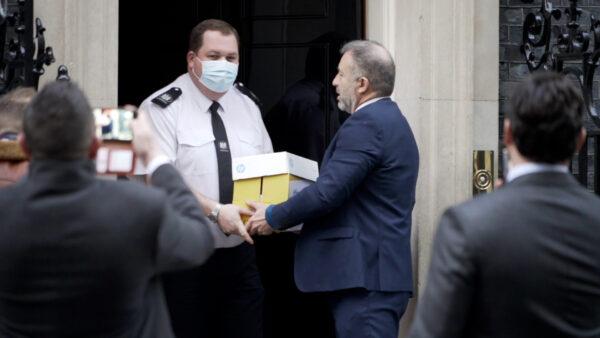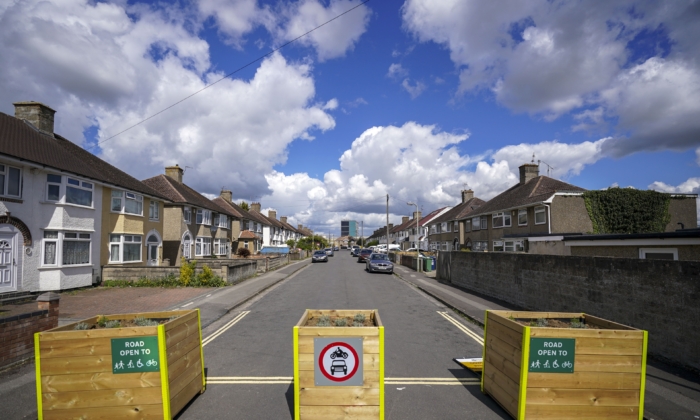Report Finds Democratic Division Leading to Spread of Conspiratorial Language Regarding LTNs
The report has faced criticism from opponents who dispute the claims that ‘disinformation has flourished,’ arguing that it is an attempt to introduce a ‘new layer of bureaucracy.’
Local authorities have been criticized for not providing enough information on Low Traffic Neighbourhoods before implementing the schemes, creating a “democratic gap” that leads to the proliferation of “explicitly conspiratorial rhetoric,” according to a report.
Demos stated that disinformation related to LTNs has escalated over the last 18 months with a significant increase in conspiracy theories circulating online.
“There are rumors of secretive elites imposing 15-minute city climate lockdowns in local communities and of councilors introducing surveillance systems on motorists undemocratically,” it remarked.
However, the report has been met with strong opposition from campaigners who see it as an effort to suppress independent voices and control public discussions.
LTN
LTN policy encompasses measures taken to limit motorized traffic access within specific residential areas.
These measures include barriers, bollards, road signs, and planters to restrict car movements, as well as automatic number plate recognition (ANPR) cameras and Residents’ Parking Zones (RPZs), requiring a digital permit to park in designated areas.
The report highlighted that disinformation has thrived in the growing democratic gap between councils and communities at a local level, exacerbated by the decline of local news outlets.
It mentioned that the absence of local newspapers and other media platforms has also contributed to the lack of space for reasoned debates on the issue, pushing people towards social media where discussions on LTNs have become toxic.
Demos
Demos has received funds from various sources, including businesses like Chinese telecoms company Huawei, vape makers JUUL, left-wing organizations like the Barrow Cadbury Trust and Pierre Omidyar’s Luminate, as well as The Duke and Duchess of Sussex’s Archewell Foundation.
Luminate, a supporter of the Global Disinformation Index (GDI), focuses on combating alleged disinformation on online news platforms.

Disinformation
The report examined the Together Declaration, a prominent anti-lockdown and pro-free-speech group that advocates for public involvement in the electoral process and scrutiny of net zero policies, among other things.
It asserted that the disinformation from this group includes “attributing sinister motives to councilors, suggesting that LTNs are part of a totalitarian agenda connected to broader global initiatives, and promoting explicitly conspiratorial rhetoric tying LTN debates to unrelated schemes such as Digital Identity programs within an alleged grand plan of control.”
Demos identified posts as “disinformation” if they contained elements of the ‘Great Reset’
such as 15-minute cities, the World Economic Forum, globalists/global elites, central bank digital currencies/digital identity, and vaccine passports.
The report called for an “anti-disinformation standard in public life” and proposed a Commission that could “penalize” politicians’ behavior “if found, creating a stronger incentive to thoroughly investigate certain narratives before promoting them widely.”
Alan Miller, co-founder of the Together Declaration, told The Epoch Times, “They reinforce cynicism by turning it into conspiracy theories instead of presenting arguments and allowing for an open, transparent discussion.”
He noted that councils had implemented emergency traffic orders without consulting the public, closed streets, installed cameras, fined individuals, and resorted to name-calling when questioned.
“They then condemn all of this and reduce it to conspiracy theories without addressing the merits of the arguments and points being raised,” he added.
“It’s almost like a Brechtian or a Beckett play where they just do this mad thing and then they just keep saying it,” said Mr. Miller.
‘Strangle Democracy’
Ben Pile, from the campaign group Climate Debate UK, criticized the report for attempting to introduce a “new layer of bureaucracy to constrain democracy.”
“The report is part of a broader trend that seeks to regulate independent voices on social media, primarily on Twitter, where Demos’ research is derived from,” he remarked.
He argued that WEF/Great Reset narratives “alienate people, and that critics of Net Zero and other policy agendas should focus on the specifics of those policies and their shortcomings rather than on generalized storylines.”
“But Demos’ report specifically proposes policies to regulate public discourse, such as ‘an anti-disinformation standard in public life,’ which would apply to political parties,” he said.
He criticized the report for advocating for a regulating body, similar to Ofcom, to “censor” MPs, ministers, and recommendations that “aim to control local government, news media, social media, and independent organizations.”
“They want to portray groups like Together as malicious actors who spread misinformation on social media, but they fail to engage with anything we have stated or done. They use computer analysis to superficially scrutinize tweets without providing concrete evidence for their allegations. They also disregard contradictory information,” he stated.
If Demos were to address the arguments in his report on air pollution policies (ULEZ/LTNs, etc.), he contended that they would have to confront the fact that they are one of many fake “civil society” organizations, funded by extremely wealthy individuals, and have dominated UK politics for too long without producing any positive outcomes, contributing to the crisis of democracy that is now being acknowledged and examined.
The Epoch Times reached out to Demos for comment.





